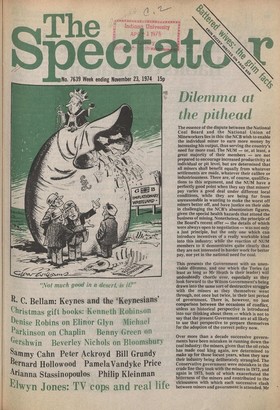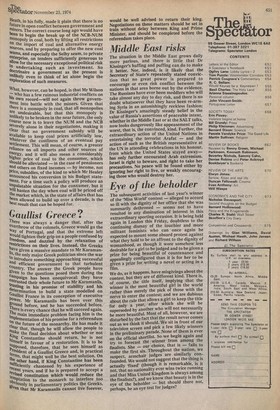Dilemma at the pithead
The essence of the dispute between the National Coal Board and the National Union of Mineworkers lies in this: the NCB wish to enable the individual miner to earn more money by increasing his output, thus serving the country's need for more coal. The NUM — or, at least, a great majority of their members — are not prepared to encourage increased productivity at individual or pit level, but are determined that all miners shall benefit equally from whatever settlements are made, whatever their calibre or industriousness. There are, of course, qualifications to this argument, and the NUM have a perfectly good point when they say that miners' pay varies a good deal under different local conditions, while they are being far from unreasonable in wanting to make the worst off miners better off, and have justice on their side in challenging the NCB's absenteeism figures, given the special health hazards that attend the business of mining. Nonetheless, the principle of the Board's recent offer — the details of which were always open to negotiation — was not only a just principle, but the only one which can introduce incentives of a really workable kind into this industry; while the reaction of NUM members to it demonstrates quite clearly that they are not interested in harder work for better pay, nor yet in the national need for coal.
This presents the Government with an unenviable dilemma, and one which the Tories (at least as long as Mr Heath is their leader) will undoubtedly chortle over, especially as they look forward to the Wilson Government's being drawn into the same sort of destructive struggle with the miners as they themselves went through, not once but twice, in their last period of government. There is, however, no just comparison between the occasions of conflict, unless an historical perspective is introduced into our thinking about them — which is not to say that the present Government are at all likely to use that perspective to prepare themselves for the adoption of the correct policy now.
Over more than a decade successive governments have been mistaken in running down the coal industry: the miners, given that the oil crisis has made coal king again, are determined to make up for those locust years, when they saw their industry being deliberately strangled. The Conservative government were mistaken in the crude line they took with the miners in 1972, and again in 1973, both of which exacerbated the bitterness of the miners and contributed to the viciousness with which each successive clash between miners and government is attended. Mr Heath, in his folly, made it plain that there is no future in open conflict between government and miners. The correct course long ago would have been to begin the break up of the NCB-NUM monopoly in coal, both by lifting all restrictions an the import of coal and alternative energy sources, and by preparing to offer the new coal seams, and especially the Selby seam, to private enterprise, on tenders sufficiently generous to .allow for the necessary exceptional political risk In undertaking such an investment. So doctrinaire a government as the present is unlikely even to think of let alone begin the exploration of such measures.
What, however, can be hoped, is that Mr Wilson Who has a few ruinous industrial conflicts on nitS own record—will not again throw govern ment into battle with the miners. Given that there is a monopoly in coal, that all monopolies are undesirable, but that this monopoly is unlikely to be broken in the near future, the only Course now is to leave the NUM and the NCB severely alone in their negotiations, making it clear that no government subsidy will be available to keep coal prices artificially low, 'whatever the costliness of an eventual pay settlement. This will mean, of course, a greater reliance on oil imports and other sources of eLa, ergY, and it will also mean a considerably lugher price of coal to the consumer, which should be alleviated — in the case of pensioners and others on fixed incomes — by income, not Price, subsidies, of the kind to which Mr Healey announced his conversion in his Budget statefluent. For a time such a policy will produce an unpalatable situation for the conxumer, but it will hasten the day when coal will be priced off Plie market which, in the state of affairs that has ;)een allowed to build up over a decade, is the neSt result that can be hoped for.
Gaullist Greece? There was always a danger that, after the nverthrow of the colonels, Greece would go the Way of Portugal, and that the extreme left would tighten their grip on a people confused by freedom, and dazzled by the relaxation of lestrietions on their lives. Instead, the Greeks Pve given a massive mandate to Mr Karamanas,.the only major Greek politician since the war Le Introduce something approaching successful and efficient government to that turbulent e9untry. The answer the Greek people have given to the questions posed them during the ean1Paign has been unequivocal: they have entrusted their whole future to Mr Karamanlis, 1111sting in his promise of stability and his ILletermination to build a state modelled on 1i-aullist France in its conception of executive PnWer. Mr Karamanlis has been over this .tr°und before, and he has succeeded before. „here is every chance that he will succeed again.
main immediate problem facing him is the ,RIPlementation of his promise for a referendum '11 the future of the monarchy. He has made it clear that, though he will allow the people to litclabe the final decision about whether or not h.Ing Constantine should return, he is not :Iniself in favour of a restoration. It is to be 'haPPosed, therefore, that he sees himself as Jtesident of a Gaullist Greece and, in practical LerMs, that might well be the best solution. On Zue Other hand, if King Constantine has been rUfficiently chastened by his experience of 1r,ent years, and if he is prepared to accept a tAllsed constitution whichwould reduce the o'kuptation to the monarch to interfere too ..:'Inously in parliamentary politics the Greeks, biven that Mr Karamanlis cannot live forever, would be well advised to return their king. Negotiations on these matters should be set in train without delay between King and Prime Minister, and should be completed before the referendum takes place.
Middle East risks
The situation in the Middle East grows daily more parlous, and there is little that Dr Kissinger's huffing and puffing can do to make it better. Nor, indeed, is it likely that the Secretary of State's repeatedly stated convic tion that no great power is prepared to encourage or even risk conflict between the nations in that area borne out by the evidence. The Russians have ever been meddlers who will take almost any day to day risk, and there is no doubt whatsoever that they have been re-arming Syria in an astonishingly reckless fashion: Dr Kissinger's amazingly steady belief in the value of Russia's assertions of peaceable intent, whether in the Middle East or at the SALT talks, now looks dangerously like appeasement of the worst, that is, the convinced, kind. Further, the extraordinary action of the United Nations in entertaining the terrorist Arafat — and the action of such as the British representative at the UN in attending celebrations in his honour, from which the United States stayed away— has only further encourated Arab extremism. Israel is right to beware, and right to take her precautions. No peace will be found either by ignoring her right to live, or weakly encouraging those who would destroy her.
Eye of the beholder
The subsequent activities of last year's winner of the 'Miss World' contest — alleged to accord so ill with the dignity of her office that she was summarily dethroned — seems not to have resulted in any diminution of interest in this extraordinary sporting occasion. It is being held again in London this Friday, doubtless to the continuing dismay of the touchier and more militant feminists who can once again be expected to mount some absurd protest against what they hold to be an affront to the dignity of womanhood, as though it were somehow less desirable for a girl to be judged and to be given a prize for being beautiful of countenance and appealingly configured than it is for her to be given a prize for writing a novel or acting in a film.
We do, as it happens, have misgivings about the contest, but they are of different kind. There is, of course, the title itself, implying that the winner is the most beautiful girl in the world rather than merely the pick of those with the nerve to enter the contest; and we are dubious about the rule that allows a girl to keep the title for only a year, after which she will be superseded by another who will not necessarily be more beautiful. Most of all, however, we are disturbed by the fact that the result never comes out as we think it should. We sit in front of our television screen and pick a few likely winners in the preliminary parade. None of them is ever on the official shortlist. So Ave begin again and try to forecast the winner from among the finalists. She — our choice, that is — fails, to make the first six. Throughout the nation, we suspect, armchair judges are similarly confounded. We would not suggest that the thing is actually 'fixed' (though it is remarkable, is it not, that no nationality ever wins twice running and that Miss United Kingdom is always among the finalists?), and we know that beauty is in the eye of the beholder — but should there not, perhaps, be an eye test for judges?



































 Previous page
Previous page